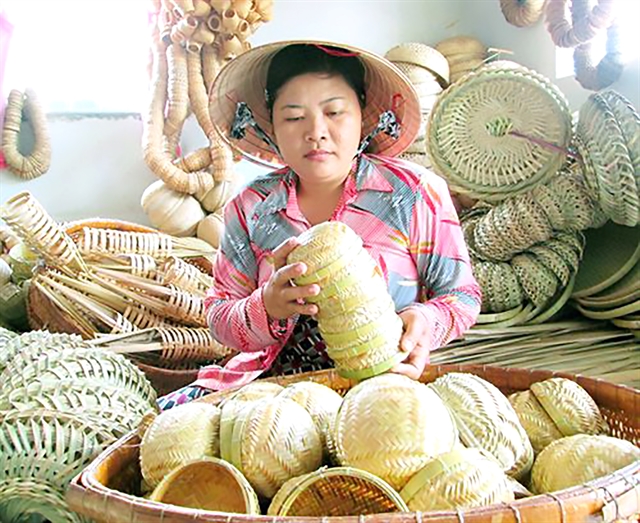 Society
Society

 |
| Rattan weaving is one of the traditional occupations in Sóc Trăng. Photo: tuilanguoimientay.vn |
SÓC TRĂNG — The Cửu Long (Mekong) Delta province of Sóc Trăng is seeking to nurture traditional occupations in rural areas to ensure their products survive and to create jobs.
There are 27 rural occupations in the province.
It has many ethnic minorities, including the Khmer and Hoa, who are carrying on rural occupations.
In Châu Thành District, 48 per cent of the population is Khmer.
It is also home to many famous handicraft villages that make traditional products such as bánh pía (cake made from flour, green bean, salted egg yolk, and other ingredients), glutinous rice flakes, bamboo knitted items, and glass painting.
Ngã Năm Town has for long been renowned for making sedge mats and other knitted products.
Bùi Văn Liệt’s family in Ngã Năm’s Mỹ Qưới Commune has for three generations been weaving sedge mats and now makes more than 100 a month.
What used to be made completely by hand is now mostly made by machines, he said.
Trương Thị Loan, his wife, said the price of a mat is only VNĐ80,000 - 100,000 (US$3.4 - 4.2), and her family earns little because of the high price of sedges.
“Whether we earn high or low profits, we have to continue making the mat because it is our traditional occupation.”
Nguyễn Văn Toản, Deputy Chairman of the commune People’s Committee, said the number of people making sedge mats is not large and they now face competition from plastic and bamboo mats, and the occupation is gradually dying.
“However, some people in Mỹ Quới still preserve the traditional family occupation.”
Vương Quốc Nam, Deputy Chairman of the Sóc Trăng People’s Committee, said the province aims to increase the value and quality of rural occupations by developing craft and traditional craft villages.
It also plans to develop new rural occupations suitable for each locality and contribute to implementation of the national programme to build new-style rural areas.
It plans to increase the number of craft and traditional craft villages that have products rated at least three stars under the national “One Commune - One Product” (OCOP) programme by 10-12 by 2030.
Three to five of the villages will offer tourism services by 2030.
The province has earmarked VNĐ200 billion ($8.4 million) to develop rural occupations in 2022-30.
To help achieve this, Huỳnh Ngọc Nhã, director of the Department of Agriculture and Rural Development, said there would be policies, soft loans and other favourable conditions for production establishments.
The province will implement the OCOP programme in combination with its plans to develop rural occupations, and develop a supply - demand linkage programme for products made in craft and traditional craft villages.
It will boost advocacy to develop agriculture-related and rural tourism.
It will implement rural skills training programmes in combination with others to develop rural areas, and set up websites to introduce and sell rural products.
It will develop the collective economy and persuade companies, co-operatives and co-operative groups to develop linkages to ensure origin traceability, quality management and improvement in product value.
It will encourage and assist in the use of advanced techniques by production establishments. — VNS